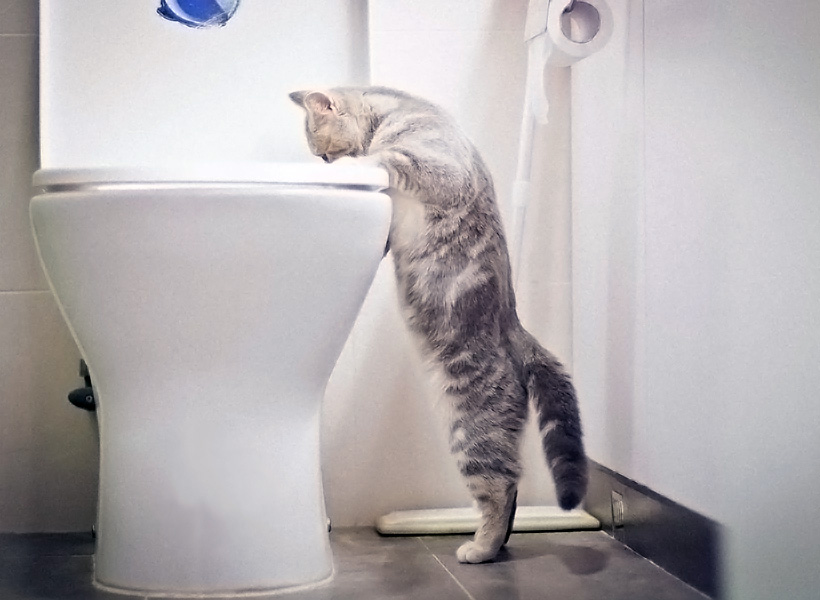Why You Should Avoid Flush Cat Poop Down Your Toilet - Important Facts
Why You Should Avoid Flush Cat Poop Down Your Toilet - Important Facts
Blog Article
We've stumbled upon this great article involving Can You Flush Cat Poop Down The Toilet? listed below on the internet and concluded it made sense to relate it with you over here.

Intro
As pet cat proprietors, it's important to bear in mind exactly how we take care of our feline close friends' waste. While it might seem convenient to purge pet cat poop down the toilet, this practice can have destructive effects for both the atmosphere and human wellness.
Alternatives to Flushing
Thankfully, there are much safer and more liable ways to take care of pet cat poop. Consider the following alternatives:
1. Scoop and Dispose in Trash
The most usual method of disposing of cat poop is to scoop it right into a biodegradable bag and toss it in the garbage. Make sure to make use of a devoted clutter scoop and throw away the waste quickly.
2. Usage Biodegradable Litter
Go with eco-friendly feline clutter made from materials such as corn or wheat. These trashes are eco-friendly and can be securely dealt with in the trash.
3. Bury in the Yard
If you have a lawn, think about hiding cat waste in an assigned location away from vegetable yards and water sources. Make sure to dig deep sufficient to avoid contamination of groundwater.
4. Set Up a Pet Waste Disposal System
Purchase an animal waste disposal system specifically designed for pet cat waste. These systems make use of enzymes to break down the waste, minimizing odor and ecological influence.
Health and wellness Risks
In addition to ecological worries, flushing pet cat waste can likewise pose wellness risks to human beings. Feline feces might include Toxoplasma gondii, a bloodsucker that can trigger toxoplasmosis-- a possibly severe ailment, especially for expectant women and individuals with damaged immune systems.
Environmental Impact
Flushing feline poop presents unsafe microorganisms and bloodsuckers into the water system, posing a considerable risk to marine environments. These impurities can negatively impact marine life and compromise water top quality.
Final thought
Responsible animal possession prolongs beyond supplying food and sanctuary-- it additionally involves correct waste administration. By avoiding purging feline poop down the toilet and choosing different disposal techniques, we can reduce our environmental impact and secure human health and wellness.
Why You Should Never Flush Cat Poop Down the Toilet
A rose by any other name might smell as sweet, but not all poop is created equal. Toilets, and our sewage systems, are designed for human excrement, not animal waste. It might seem like it couldn’t hurt to toss cat feces into the loo, but it’s not a good idea to flush cat poop in the toilet.
First and foremost, assuming your cat uses a litter box, any waste is going to have litter on it. And even the smallest amount of litter can wreak havoc on plumbing.
Over time, small amounts build up, filling up your septic system. Most litter sold today is clumping; it is made from a type of clay that hardens when it gets wet. Ever tried to scrape old clumps from the bottom of a litter box? You know just how cement-hard it can get!
Now imagine just a small clump of that stuck in your pipes. A simple de-clogger like Drano isn’t going to cut it. And that means it’s going to cost you big time to fix it.
Parasitic Contamination
Believe it or not, your healthy kitty may be harboring a nasty parasite. Only cats excrete Toxoplasma in their feces. Yet it rarely causes serious health issues in the cats that are infected. Most people will be fine too if infected. Only pregnant women and people with compromised immune systems are at risk. (If you’ve ever heard how women who are expecting are excused from litter cleaning duty, Toxoplasma is why.)
But other animals may have a problem if infected with the parasite. And human water treatment systems aren’t designed to handle it. As a result, the systems don’t remove the parasite before discharging wastewater into local waterways. Fish, shellfish, and other marine life — otters in particular — are susceptible to toxoplasma. If exposed, most will end up with brain damage and many will die.
Depending on the species of fish, they may end up on someone’s fish hook and, ultimately on someone’s dinner plate. If that someone has a chronic illness, they’re at risk.
Skip the Toilet Training
We know there are folks out there who like to toilet train their cats. And we give them props, it takes a lot of work. But thanks to the toxoplasma, it’s not a good idea.

I am very interested by How to Dispose of Cat Poop and Litter Without Plastic Bags and I really hope you enjoyed reading our blog posting. Sharing is good. Who knows, you might be helping someone out. Many thanks for taking the time to read it.
View Report this page